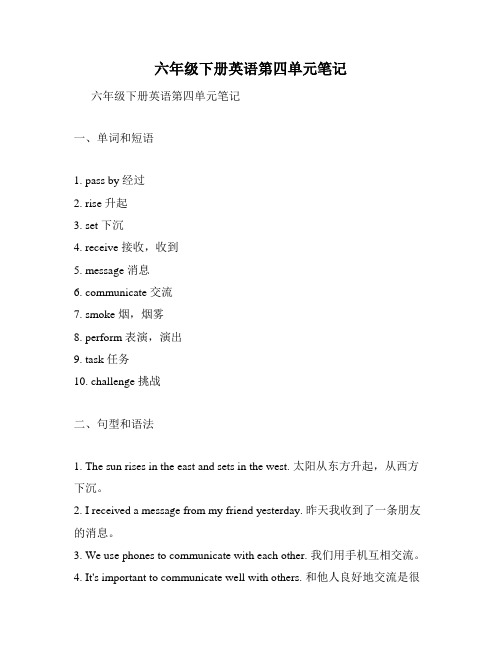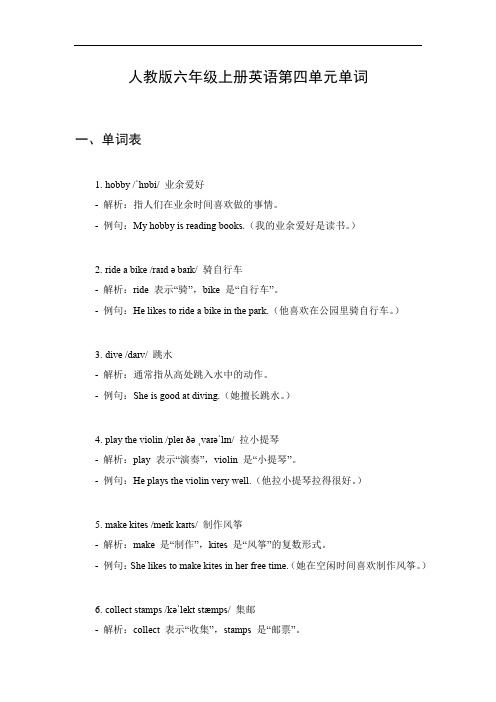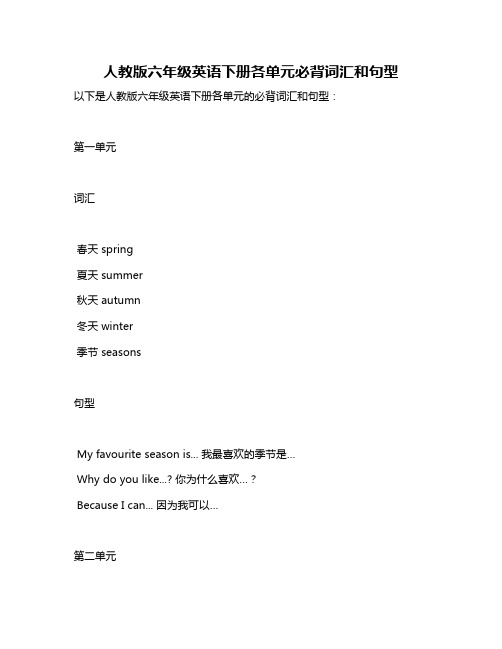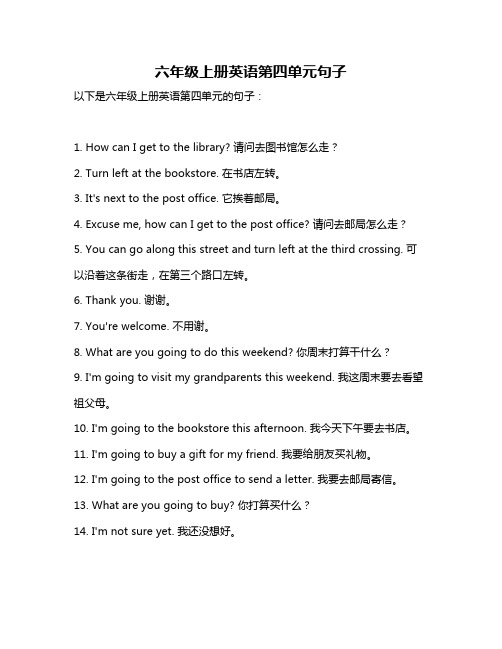六年级英语四六单元单词句子
六年级下册英语第四单元笔记

六年级下册英语第四单元笔记六年级下册英语第四单元笔记一、单词和短语1. pass by 经过2. rise 升起3. set 下沉4. receive 接收,收到5. message 消息6. communicate 交流7. smoke 烟,烟雾8. perform 表演,演出9. task 任务10. challenge 挑战二、句型和语法1. The sun rises in the east and sets in the west. 太阳从东方升起,从西方下沉。
2. I received a message from my friend yesterday. 昨天我收到了一条朋友的消息。
3. We use phones to communicate with each other. 我们用手机互相交流。
4. It's important to communicate well with others. 和他人良好地交流是很重要的。
5. Smoke rises into the sky. 烟雾升向天空。
6. They will perform a play on the stage tonight. 他们今晚将在舞台上表演一出戏剧。
7. The teacher gave us a challenging task. 老师给了我们一个具有挑战性的任务。
三、重点内容1. 升起和下沉的物体:太阳升起和下沉,烟雾升向天空。
2. 信息和交流:通过接收消息和使用电话进行交流。
3. 表演和任务:在舞台上表演戏剧,完成具有挑战性的任务。
四、例句展示1. I like watching the sunrise. 我喜欢看日出。
2. The sun sets and it gets dark outside. 太阳下沉,外面变暗了。
3. I received a message from my teacher this morning. 今天早上我收到了老师的消息。
六年级第四单元英语单词

小学六年级英语第四单元单词1. indoor adj. 室内的短语:indoor games, photography, activities 室内游戏﹑摄影﹑活动2. outdoor adj. 室外的短语:outdoor activities, clothing, sports 户外活动/户外穿的衣服/户外运动3. really adv. 真正地;的确例句:What do you really think about it?你对那件事究竟是怎样想的?4. forget v. 忘记例句:I've forgotten her name.我把她的名字忘了。
5. puzzle n. 智力游戏;拼图例句:Their reason for doing it is still a puzzle to me.他们为什么要做此事我仍莫名其妙。
6. playground n. 操场例句:Children are running happily in the playground.孩子们快乐地在操场上奔跑着。
7. piano n. 钢琴短语:play a tune on the piano 用钢琴弹一个曲子8. model n. 模型短语:a model of the proposed new airport 拟建的新机场模型9. health n. 身体(或精神)状况;健康短语:be in/enjoy the best of health 身体非常好10. problem n. 问题;难题;困难例句:We've got a problem with the car, it won't start!我们的汽车出故障了--发动不起来!11. headache n. 头痛例句:I had a really bad headache , and couldn't go to work.我的头真的很疼,我无法工作了。
六年级英语下册第四单元重点句型及词汇,英语教案.docx

.精品文档 .六年级英语下册第四单元重点句型及词汇, 英语教案PEP小学六年级英语下册第四单元重点句型及词汇第四单元四会单词:learn hinese— learned hinese学汉语sing and dane —sang and daned唱歌和跳舞eat gd fd— ate gd fd吃好吃的食物take pitures—tk pitures照相lib— libed爬have— had buy presents—bught presents买礼物rw a bat—rwed a bat划船see elephant—saw elephant看大象g skiing— went skiing去滑雪g ie-skating— went ie-skating去滑冰hw 怎么,如何get—gt到达last上一个的,仅余的,留在最后的四会句型:here did yu g n yur hliday?你去哪里度假了?I went t Xiniang.我去新疆了。
Hw did yu g there?你怎么去那儿的?I went by train.我坐火车去的。
应该掌握的知识点:2016 全新精品资料 - 全新公文范文 -全程指导写作–独家原创1 / 3.精品文档 .1、前介的用法:英中不同的前所用的介不相同,一般有如下( 1)在表示一段的前用in ,如在年份、月份、季前用in ,如 in2009, in ay, in spring等。
另外在上午、在下午、在晚上也用in. in the rning, in the afternn, in the evening.(2)表示在某一天,在星期几,在几月几日用n,如 n nday , n ay 1st.另外有n Tuesday rning.(3)表示具体的刻,在⋯几点用at 。
如 at 6 ’lk. at 7:20.2、英信的写格式;(1)称呼:指收信人的称呼。
一般从信的左格写起。
六年级上册人教版英语第四单元单词

人教版六年级上册英语第四单元单词一、单词表1.hobby /ˈhɒbi/ 业余爱好-解析:指人们在业余时间喜欢做的事情。
-例句:My hobby is reading books.(我的业余爱好是读书。
)2.ride a bike /raɪd ə baɪk/ 骑自行车-解析:ride 表示“骑”,bike 是“自行车”。
-例句:He likes to ride a bike in the park.(他喜欢在公园里骑自行车。
)3.dive /daɪv/ 跳水-解析:通常指从高处跳入水中的动作。
-例句:She is good at diving.(她擅长跳水。
)4.play the violin /pleɪ ðə ˌvaɪəˈlɪn/ 拉小提琴-解析:play 表示“演奏”,violin 是“小提琴”。
-例句:He plays the violin very well.(他拉小提琴拉得很好。
)5.make kites /meɪk kaɪts/ 制作风筝-解析:make 是“制作”,kites 是“风筝”的复数形式。
-例句:She likes to make kites in her free time.(她在空闲时间喜欢制作风筝。
)6.collect stamps /kəˈlekt stæmps/ 集邮-解析:collect 表示“收集”,stamps 是“邮票”。
-例句:My grandfather collects stamps.(我的爷爷集邮。
)二、记忆方法1.联想记忆:对于每个单词,可以联想与之相关的场景或活动,帮助记忆。
比如“ride a bike”可以想象自己骑自行车的画面;“play the violin”可以想象音乐家拉小提琴的场景。
2.分类记忆:可以将这些单词按照不同的爱好类型进行分类,比如运动类(ride a bike、dive)、音乐类(play the violin)、手工类(make kites)和收藏类(collect stamps)。
人教版六年级英语下册各单元必背词汇和句型

人教版六年级英语下册各单元必背词汇和句型以下是人教版六年级英语下册各单元的必背词汇和句型:第一单元词汇春天 spring夏天 summer秋天 autumn冬天 winter季节 seasons句型My favourite season is... 我最喜欢的季节是…Why do you like...? 你为什么喜欢…?Because I can... 因为我可以…第二单元词汇游泳 swim滑冰 skate放风筝 fly a kite堆雪人 make a snowman季节活动 seasonal activities句型What do you do in the...? 你在…做什么?I usually... 我通常…Do you often...? 你经常…吗?Yes, I do. / No, I don’t. 是的,我经常。
/ 不,我不经常。
第三单元词汇星期一 Monday星期二 Tuesday星期三 Wednesday星期四 Thursday星期五 Friday星期六 Saturday星期日 Sunday星期 weekdays星期天 weekends句型What do you have on...? 你星期几有什么课?I have... 我星期几有…课。
When do you have...? 你什么时候有…课? I have... on... 我在星期几有…课。
第四单元词汇电影 movies公园 parks图书馆 libraries博物馆 museums商店 shops饭店 restaurants医院 hospitals学校 schools银行 banks邮局 post offices公共场所 public places 句型。
六年级英语上册重点知识清单Module4(外研版一起)(1)

六年级上学期M4重点学校:班级:姓名:一、重点单词:Thanksgiving感恩节special特殊的nearly差不多,将近poem诗amazing令人惊讶的sure当然December十二月light灯二、重点短语:National Day国庆节a big, special dinner一顿丰盛的特别的晚餐have a lot of fun玩得开心write a poem写一首诗the Spring Festival春节in many countries在许多国家on the 25th of December在十二月二十五日Christmas trees圣诞树give presents赠送礼物send cards寄贺卡the White House白宫favourite festival最喜爱的节日the MidAutumn Festival中秋节the Dragon Boat Festival 端午节the Lantern Festival元宵节country(复数)countrieslove(形容词)lovelysound(三单)soundseat(过去式)ateI(宾格)methey(/宾格)themwe(宾格)usAmerica(形容词)American三、重点句型:1. A: Which festival in the US is your favourite?在美国你最喜欢的节日是哪一个?B:My favorite festival is Thanksgiving .我最喜欢的节日是感恩节。
2. A: What do you do on Thanksgiving Day?感恩节那天你们干什么?B: We always have a big, special dinner. We say “Thank you” for our food, family and通常吃一顿特别的大餐。
六年级上册英语第四单元句子

六年级上册英语第四单元句子
以下是六年级上册英语第四单元的句子:
1. How can I get to the library? 请问去图书馆怎么走?
2. Turn left at the bookstore. 在书店左转。
3. It's next to the post office. 它挨着邮局。
4. Excuse me, how can I get to the post office? 请问去邮局怎么走?
5. You can go along this street and turn left at the third crossing. 可以沿着这条街走,在第三个路口左转。
6. Thank you. 谢谢。
7. You're welcome. 不用谢。
8. What are you going to do this weekend? 你周末打算干什么?
9. I'm going to visit my grandparents this weekend. 我这周末要去看望祖父母。
10. I'm going to the bookstore this afternoon. 我今天下午要去书店。
11. I'm going to buy a gift for my friend. 我要给朋友买礼物。
12. I'm going to the post office to send a letter. 我要去邮局寄信。
13. What are you going to buy? 你打算买什么?
14. I'm not sure yet. 我还没想好。
小学六年级英语前四个单元的重点句子

英语前四个单元的重点句子:1.将来时:常与表示将来的时间状语连用,如:tomorrow,tonight,this+时间,next,soon 2.一般将来时通常有两种表达形式:be going to+动词原形和will+动词原形(但要注意:这里的be动词随着主语的人称和数的变化而变化:第一人称作主语时,be 为am,第二人称或所有人称的复数作主语时,be为are,第三人称单数作主语时,be 为is。
例:I’m going to see a film tonight.Mrs White is not going to make dinner this evening.Are they going to play football after school today?.will和be going to 的区别:Will 通常只表示单纯的将来,并无按规定或计划的意思。
而be going to表示打算或准备好要做的事3.Shall 也可以用在一般将来时中,但是只限于主语为第一人称I和We,句型为:Shall we\I+动词原形+……?例:Shall we go to visit Beijing this Sunday?肯定回答:Great\Good idea\OK 否定回答:No,It's boring.4.Would you like to ……?肯定回答:Yes,I’d love to.否定:Sorry,I can’t.5.My family are going fishing.这个句子是用现在进行时表示将来。
使用现在进行时表示将来通常限于come,go,leave,begin,start等动词。
例:I am going swimming with my friends.我打算和朋友们去游泳。
The holiday is coming,假期快到了。
6.Why don’t you + 动词原形……?=Why not +动词原形例:Why don’t you play games with us?=Why not play games with us?7.Do you want to play table tennis with me tonight? “want to do sth”表示“想做某事”8.But you’d better ask your parents first.“You’d bette+动原”9.Let’s go to Xiangjiang Zoo instead.我们去香江动物园好了。
- 1、下载文档前请自行甄别文档内容的完整性,平台不提供额外的编辑、内容补充、找答案等附加服务。
- 2、"仅部分预览"的文档,不可在线预览部分如存在完整性等问题,可反馈申请退款(可完整预览的文档不适用该条件!)。
- 3、如文档侵犯您的权益,请联系客服反馈,我们会尽快为您处理(人工客服工作时间:9:00-18:30)。
▁▁▁▁▁(爱好) ▁▁▁▁▁▁▁--▁▁▁▁▁▁▁▁(骑自行车) ▁▁▁▁▁--▁▁▁▁▁(跳水) ▁▁▁▁▁▁—▁▁▁▁▁▁▁(拉小提琴) ▁▁▁▁▁▁▁—▁▁▁▁▁▁▁(制作风筝)
▁▁▁▁▁▁—▁▁▁▁▁▁(集邮) ▁▁▁–▁▁▁(居住)
▁▁▁▁--▁▁▁▁(教) ▁▁--▁▁▁(去) ▁▁▁--▁▁▁(看)
▁▁--▁▁▁(读,看) doesn’t=▁▁▁▁▁▁▁▁(歌唱家)▁▁▁(作家)▁▁▁▁(男演员) ▁▁▁▁(女演员)▁▁▁▁(画家)▁▁▁▁(记者) ▁▁▁▁(工程师) ▁▁▁▁(会计) ▁▁▁▁(男警察) ▁▁▁▁▁▁(销售员) ▁▁▁(工作)▁▁▁▁(清洁工) ▁▁▁▁(在哪里,到哪里)▁▁▁(雨) ▁▁▁(云) ▁▁▁(太阳) ▁▁▁▁(河,溪) ▁▁▁▁(来自,从…来) ▁▁▁(种子) ▁▁▁(土壤) ▁▁▁(芽) ▁▁▁(植物) ▁▁▁(应该) ▁▁▁▁(然后)
16 你的爱好是什么?▁▁▁▁▁▁▁▁▁▁▁▁▁▁▁▁▁▁
17 我喜欢集邮。
▁▁▁▁▁▁▁▁▁▁▁▁▁▁▁▁▁▁▁▁▁
18 他也喜欢集邮。
▁▁▁▁▁▁▁▁▁▁▁▁▁▁▁▁▁▁
19 她教英语吗?不,她不教。
▁▁▁▁▁▁▁▁▁▁▁▁▁▁
20 她教数学吗?是,她教的。
▁▁▁▁▁▁▁▁▁▁▁▁▁▁
21 你妈妈是做什么的?▁▁▁▁▁▁▁▁▁▁▁▁▁▁▁▁▁
22 她是一名电视台记者。
▁▁▁▁▁▁▁▁▁▁▁▁▁▁▁▁
23 她在哪里工作?▁▁▁▁▁▁▁▁▁▁▁▁▁▁▁
24 她怎样去工作的?▁▁▁▁▁▁▁▁▁▁▁▁▁▁▁
25 雨来自哪里?▁▁▁▁▁▁▁▁26 它来自云。
▁▁▁▁▁▁▁▁
27 你怎么做呢?▁▁▁▁▁▁▁▁▁▁▁▁▁▁▁▁▁▁
28 然后你应该做什么?▁▁▁▁▁▁▁▁▁▁▁▁▁▁▁▁▁▁
1. hobby ? I like making kites.
2. your pen pal live? She in Hong Kong.
3. your mother teach Chinese ? No, math.
4. Ann go to school by bike ? , she does.
5. your pen pal a student ? Yes, he .
6. I teach lessons. I am a .
7. I clean streets. I am a .
8. I sing songs. I am a . 9. I write stories. I am a .
10. She reports the news. She’s a .
11. This person works in a supermarket. He is a .
12. This person plays in the TV show. She is .
13. She draws the pictures well. She is .
14. If I like drawing and math, I can be .
15. He likes working with numbers. He is .
16. the come from? the clouds.
3. the cloud come from? from the .
4. the come from? the water.
5.How can the water become vapour ?The and the water becomes vapour.
6. can I plant a flower ? , put the in the soil. , water it. Put it the sun. several days, you can see a .。
